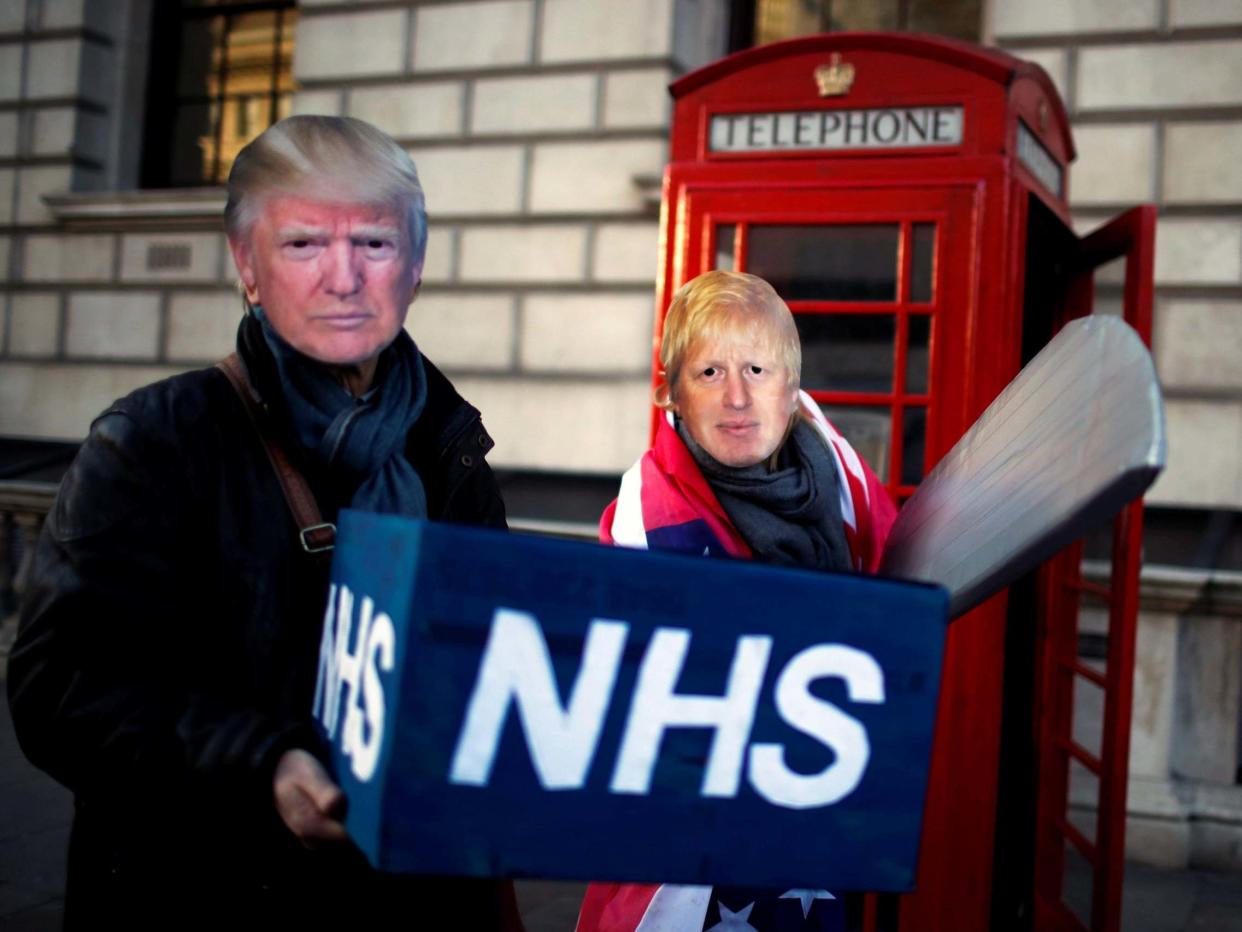The Tories claim the NHS is not up for sale – the truth is, it’s already been sold

When Boris Johnson called this election six weeks ago, he probably didn’t anticipate that two days before polling day the story dominating the headlines would be his refusal to look at a picture of a four-year-old boy with suspected pneumonia lying on a pile of coats on the floor of an A&E in Leeds. So much for the “Brexit election”.
In fact, this election might go down in history as the “NHS election”. This is a big problem for Johnson because the Conservatives – who opposed the creation of the National Health Service in 1948 – are, unsurprisingly, not trusted by voters to protect the NHS.
Mistrust among voters has been driven by a number of issues. First, the Conservatives have consistently underfunded the NHS. David Cameron always claimed the NHS was “ring-fenced” from cuts, but the balance sheet says something different: spending increases for the NHS have slowed dramatically under austerity, down to an annual average of about 1 per cent between 2010 and 2015, compared with an annual average of 6 per cent between 1997 and 2010, under Tony Blair and Gordon Brown.
Second, cuts that the Conservatives have made elsewhere – to social care and welfare, for example – have put increasing pressure on the NHS. More and more people are going to hospital: the number of visits to A&E rose 40 per cent between 2003 and 2016. Once they get there, they are waiting longer and longer to be seen: the percentage of patients seen within four hours has fallen below 90 per cent in England.
Funding is not the only problem. Jeremy Corbyn recently revealed that he had been given access to leaked internal documents from the Department for International Trade detailing talks between the US and the UK. Corbyn claimed that the documents show Johnson has signalled his willingness to give US healthcare companies greater access to the NHS.
Johnson has repeatedly denied that the NHS is “on the table” in any US trade deal. Similarly, many media commentators have reacted with scorn to the suggestion that the NHS will ever face privatisation, and are apparently more interested in the source of the leaks than their content. But is it so ridiculous to suggest that the NHS might face privatisation? And what would this really mean?
The NHS is like no other institution in the UK. It is the country’s single largest employer and the fifth largest in the world. It has both a monopoly – as a market-dominating seller – and a monopsony – as a market-dominating buyer – in UK healthcare. It is repeatedly ranked as among the most effective healthcare systems in the world.
Its structure, however, is mind-bendingly complex: rather than a single entity, it is a collection of institutions that deal with everything from research to primary care, acute care and mental-health services. Some of these institutions – GPs, for example – have always been private. Others, such as most hospital trusts, are public or semi-public bodies supervised by the Department of Health, while still others, such as public health and social care, are provided directly by local authorities.
An institution so large would be all but impossible to privatise wholesale. Attempting to float the NHS on the UK stock market would take years to organise and wreak havoc on financial markets. What’s more, it would almost certainly spell political suicide for any government that attempted it.
But there is more than one way to privatise a public entity. In fact, the largest single privatisation ever undertaken by the British state was of council housing under Right to Buy, through millions of small transactions with individual tenants. Privatisation by stealth is often easier, and more politically tenable, than one big sell-off.
The NHS has been privatised by stealth for years now. First, in the 1980s, the Conservatives outsourced cleaning and catering services, now run by companies like Interserve and Serco. Then, under New Labour, the construction of new hospitals was privatised through disastrous Private Finance Initiatives (PFIs). Since then, administrative services have increasingly been outsourced, while more and more hospitals hire their more expensive equipment (such as MRI scanners) from private companies.
The coalition government accelerated healthcare privatisation. The value of private contracts awarded in the NHS has nearly doubled over three years, from £1.9bn in 2017 to £3.6bn today. Physiotherapy, elderly care, even cancer services, are now all facing privatisation, and £15bn worth of services have been sold off in the last 5 years. David Rowland, of the Centre for Health and the Public Interest estimates that nearly 18 per cent of NHS services are run by private providers.
The result has been disastrous. The introduction of the profit motive into the NHS has worsened services and increased costs. There is evidence that rates of MRSA infection are nearly 50 per cent higher in hospitals that outsource cleaning services than in those that don’t. Meanwhile, an attempt in Staffordshire to privatise cancer services had to be abandoned in the face of mounting costs.
The Conservatives claim that the NHS is not up for sale, but the truth is that much of it has already been sold. Thankfully, in this NHS election, they are up against an opposition committed to reversing the sinister creep of privatisation, and to creating a truly national health service.
Grace Blakeley is the author of Stolen: How to Save the World from Financialisation. She sits on Labour’s National Policy Forum.
Read more
The NHS crisis prompted a flurry of bets on a Labour government


